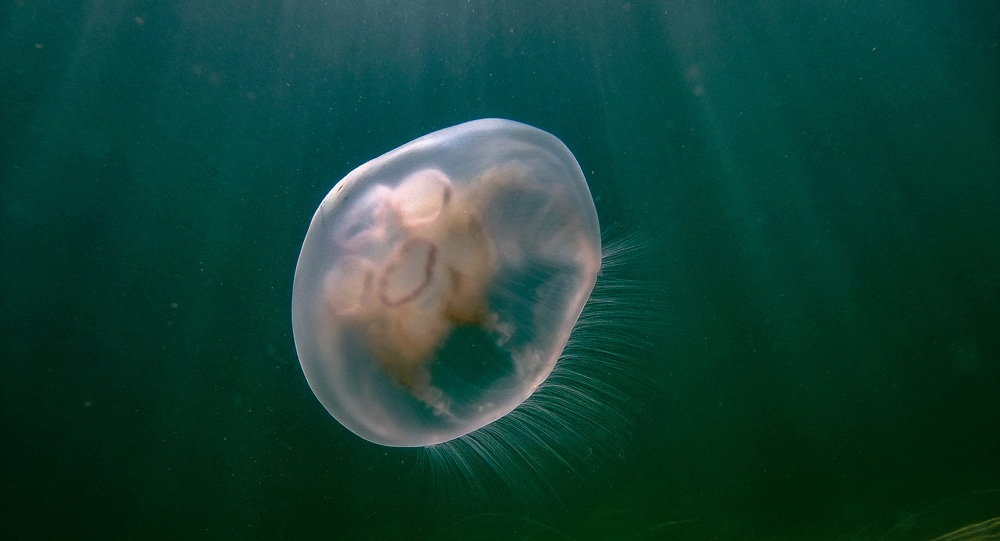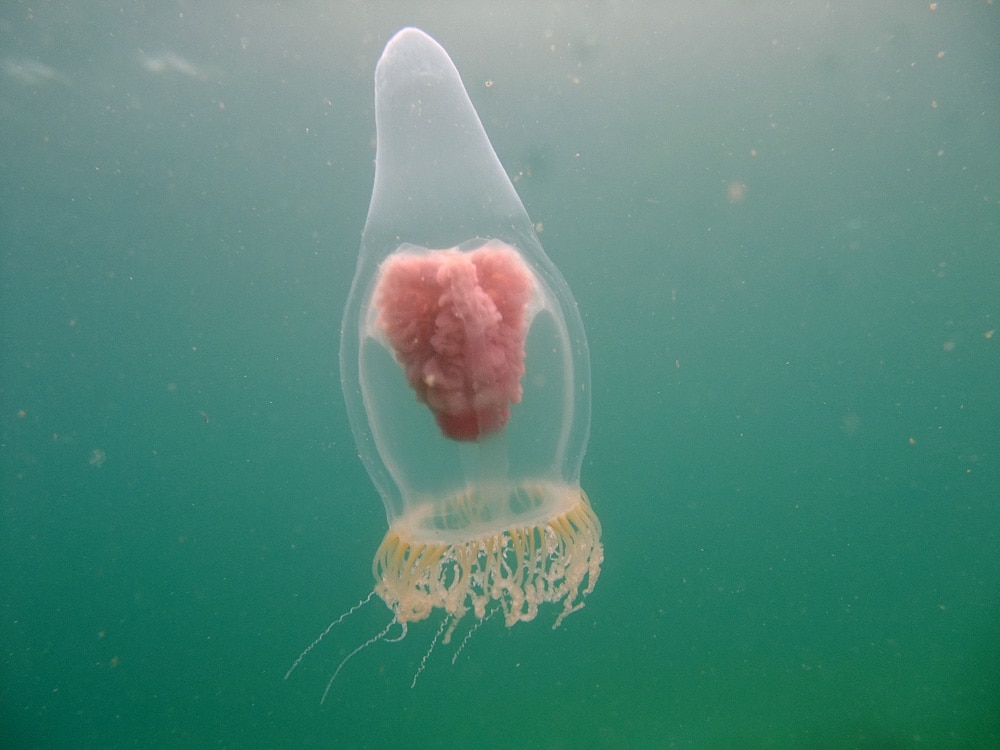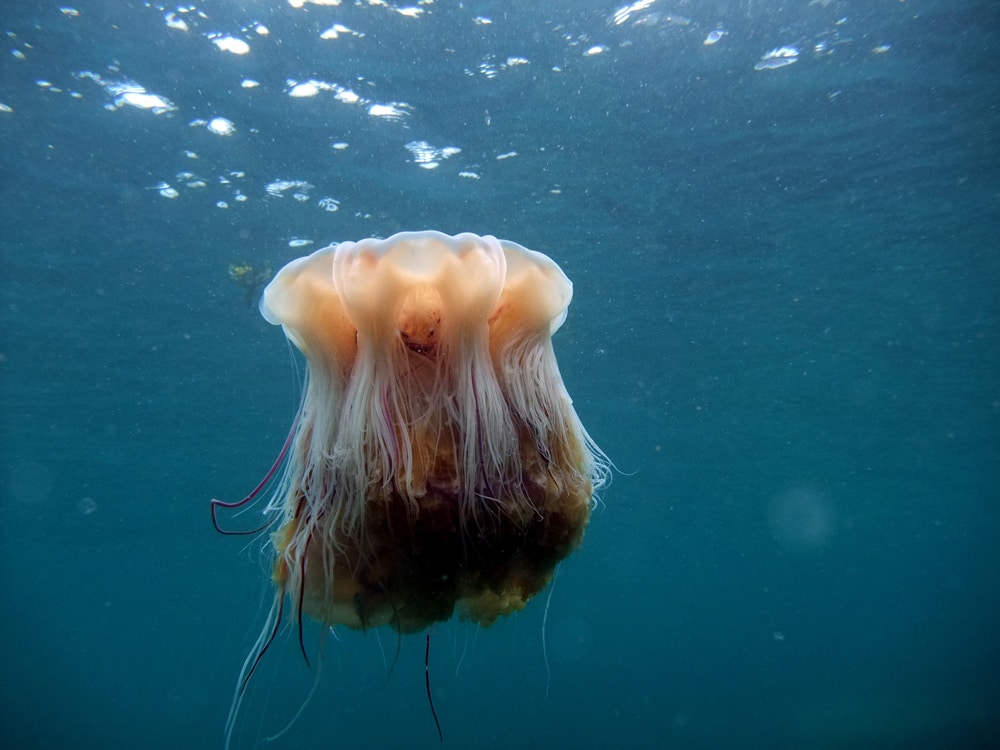Marine Life & Conservation
How well do you know your jellies? Marine Conservation Society launches new quiz for jellyfish season

 As jellyfish season is well and truly upon us, you’re likely to see more jellyfish around UK shores. The Marine Conservation Society is once again calling on beachgoers to report jellyfish sightings on the charity’s website as part of its national Jellyfish Survey.
As jellyfish season is well and truly upon us, you’re likely to see more jellyfish around UK shores. The Marine Conservation Society is once again calling on beachgoers to report jellyfish sightings on the charity’s website as part of its national Jellyfish Survey.
This year the charity is also testing the public’s jellyfish identification skills. Teaming up with the University of Plymouth, the Marine Conservation Society has launched an online Jellyfish ID Quiz to understand how easy it is for people to identify UK jellyfish with a view to improving the survey.
The Jellyfish Survey started in 2003 with the intention of understanding more about the distribution of jellyfish in the UK’s waters and how this affects leatherback turtles. Leatherbacks migrate to UK waters to feed on plentiful jellyfish bloom through the summer. However, with limited data on where these blooms happened, the Marine Conservation Society sought to gather data to identify potential feeding hotspots for leatherback turtles.
To date, thousands of people have shared sightings of jellyfish from around the UK, helping to build an extensive data set of six jellyfish and two jellyfish-like hydrozoan species.
Understanding trends in jellyfish distribution and numbers can help with more than just understanding leatherback turtles. Large jellyfish blooms can have real economic impacts on marine industries, and may also indicate the impacts of climate change on our ocean.
In 2014, with partners from the University of Exeter, the Marine Conservation Society published the first paper from the survey data, confirming key information about UK jellyfish and including the first distribution maps of the surveyed species. The paper confirmed, for example, that adult barrel jellyfish have a largely western distribution in UK seas and can survive UK winters.
The paper also identified south-west England and Wales as a jellyfish hotspot, where other work has shown a relatively high probability of leatherback turtle sightings for the UK.
Since the 2014 paper, the Jellyfish Survey has recorded notable jellyfish events such as massive and extensive annual blooms of barrel jellyfish and several summers of mass strandings of Portuguese Man o’ War.
The University of Plymouth is working with the Marine Conservation Society to analyse this most recent data. The charity hopes to run the Jellyfish Survey over a long time period to see what happens to the distribution and frequency of mass jellyfish blooms over time and attempt to explore any links with big-picture factors such as climate change.
Dr Peter Richardson, Head of Ocean Recovery at the Marine Conservation Society: “We’ve been running our National Jellyfish Survey citizen science programme for more than 17 years and, thanks to the participation of thousands of jellyfish spotters sending us their records, we are now starting to understand more about our UK jellyfish species.
“As we start to enjoy the UK’s beautiful beaches again this year, we want as many beachgoers as possible to get involved and send us their jellyfish records. Remember, you can look, but please don’t touch the jellyfish…some have a painful sting!”
The Marine Conservation Society wants to continue building on this survey data, helping to develop an ongoing understanding of jellyfish trends in UK seas. To ensure that the survey is as easy-to-use as possible, the charity is also asking members of the public to take the Jellyfish ID Quiz. Working with experts at Plymouth University, the quiz aims to find out how easy it is for people to identify the eight jellyfish and jellyfish-like species that visit the UK using the photo ID guide, with the intention to update and improve the Jellyfish Survey so it can run for many more years to come.
Catriona Duncan, MSc Student at the University of Plymouth: “Citizen science is a really valuable way to gather information and engage people with the marine environment, so we want to make sure the national Jellyfish Survey is as engaging and easy to use as possible. Jellyfish are an animal so many of us are familiar with, but surprisingly little is known about their distribution around UK waters and what causes them to bloom and increase in numbers. This project is a fantastic opportunity to help find ways to improve the survey and encourage more people to get involved for years to come.”
To take the Jellyfish ID Quiz and test your knowledge click here, and to find out more information and get involved in the National Jellyfish Survey please visit the Marine Conservation Society’s website – https://www.mcsuk.org/sightings/
Photo credit: Peter Bardsley
Blogs
The Ocean Cleanup Breaks 10,000,000 KG Barrier

The Ocean Cleanup, the global non-profit project, has removed a verified all-time total of ten million kilograms (22 million lbs.) of trash from oceans and rivers around the world – approximately the same weight as the Eiffel Tower.
To complete its mission of ridding the oceans of plastic, The Ocean Cleanup uses a dual strategy: cleaning up the Great Pacific Garbage Patch (GPGP) to remove the plastic already afloat in the oceans, while stopping the flow of plastic from the world’s most polluting rivers.
Through cleaning operations in the GPGP and in rivers in eight countries, the cumulative total of trash removed has now surpassed ten million kilograms. This milestone demonstrates the acceleration of The Ocean Cleanup’s impact, while underlining the astonishing scale of the plastic pollution problem and the need for continued support and action.
While encouraging for the mission, this milestone is only a staging point: millions more tons of plastic still pollute our oceans and The Ocean Cleanup intends to continue learning, improving and innovating to solve this global catastrophe.
This announcement comes as governments from around the world meet to continue negotiations to develop a new legally binding instrument to end plastic pollution at INC4 in Ottawa, Canada. Representatives of The Ocean Cleanup will be in attendance and the organization will be urging decision-makers to collaborate towards a comprehensive and ambitious global treaty which addresses plastic at all stages of its life cycle and in all marine environments worldwide, including in areas beyond national jurisdiction.
It is encouraging to see that the need for remediation is reflected in the various options for potential treaty provisions. It is essential that the final treaty contains clear targets for the remediation of legacy plastic pollution, and reduction of riverine plastic emissions.
Tackling plastic pollution requires innovative and impactful solutions. The treaty should therefore incentivize the innovation ecosystem by fostering innovations that make maximal use of data, technology and scientific knowledge – such as those designed and deployed by The Ocean Cleanup.
‘After many tough years of trial and error, it’s amazing to see our work is starting to pay off – and I am proud of the team who has brought us to this point.’ said Boyan Slat, Founder and CEO of The Ocean Cleanup. ‘While we still have a long way to go, our recent successes fill us with renewed confidence that the oceans can be cleaned.’
The Ocean Cleanup was founded in 2013 and captured its first plastic in 2019, with the first confirmed catch in the GPGP coming soon after the deployment of Interceptor 001 in Jakarta, Indonesia. After surpassing one million kilograms of trash removed in early 2022, the non-profit project has since progressed to the third iteration of its GPGP cleaning solution, known as System 03, and a network of Interceptors currently covering rivers in eight countries, with more deployments set for 2024.
About The Ocean Cleanup
The Ocean Cleanup is an international non-profit organization that develops and scales technologies to rid the world’s oceans of plastic. They aim to achieve this goal through a dual strategy: stemming the inflow via rivers and cleaning up the legacy plastic that has already accumulated in the ocean. For the latter, The Ocean Cleanup develops large-scale systems to efficiently concentrate the plastic for periodic removal. This plastic is tracked and traced through DNV’s chain of custody model to certify claims of origin when recycling it into new products. To curb the tide via rivers, The Ocean Cleanup has developed Interceptor™ solutions to halt and extract riverine plastic before it reaches the ocean. Founded in 2013 by Boyan Slat, The Ocean Cleanup now employs a broadly multi-disciplined team of approximately 140. The foundation is headquartered in Rotterdam, the Netherlands.
For more information, visit: theoceancleanup.com and follow @theoceancleanup on social media.
Marine Life & Conservation
Steve Backshall to headline Shark Trust’s flagship event: For the Love of Sharks

Join a host of amazing, shark loving, speakers including Steve Backshall and the Shark Trust team for an evening celebrating shark conservation at the Royal Geographical Society in London this November.
Date: 29th November 2024
Time: 6-10pm
Location: Royal Geographical Society, London
Tickets: https://www.sharktrust.org/Event/flos24
The event will be a celebration of all things shark. Those lucky enough to get hold of tickets will hear from engaging guest speakers with a passion for sharks.
The line-up includes (*subject to change if unforeseen circumstances arise)
Steve Backshall: One of television’s busiest presenters, BAFTA award-winning wildlife expert Steve has been passionate about the wild world ever since he was young.
Steve’s impressive TV career has taken him all around the world, investigating a wide array of species and environments. Steve has filmed over 100 hours of children’s wildlife programmes with the BAFTA award winning Deadly 60 franchise and recently, with Sky Nature, for his new series ‘Whale with Steve Backshall’. He has been a patron for the Shark Trust for 10 years.
Simon Rogerson: is a photojournalist specialising in natural history, diving and the sea.
He is editor of SCUBA magazine, the official journal of the British Sub-Aqua Club. Simon started his career as a crime reporter but gravitated towards his ‘less depressing’ interest in underwater exploration, joining the staff of DIVE magazine in 1999. In 2005 he was named ‘Editor of the Year’ in the PPA’s Independent Publishing Awards. Simon also works as a freelance writer, contributing frequently to the Sunday Times and Telegraph, in addition to BBC Wildlife, Esquire, and a host of international diving magazines. He is the author of a book, Dive Red Sea, published by Ultimate Sports. Now based in Berkshire, Simon has been a Patron of the Shark Trust for 20 years.
More speakers to be announced soon. Head to the Shark Trust website to learn more.
The evening will also allow guests the final chance to see the Oceanic 31, shark art exhibition. Some of the artwork will be auctioned/raffled at the event, while the rest will be auctioned online to raise money for the Shark Trust Oceanic Programme.
For the Love of Sharks is an evening with something for everyone who is interested and fascinated by sharks. Join the Shark Trust, their Patrons, Trustees and Staff, along with a host of supporters for this celebration of shark conservation.
For more information or to buy a ticket: https://www.sharktrust.org/Event/flos24
-

 News3 months ago
News3 months agoCapturing Critters in Lembeh Underwater Photography Workshop 2024: Event Roundup
-

 Marine Life & Conservation Blogs3 months ago
Marine Life & Conservation Blogs3 months agoCreature Feature: Swell Sharks
-

 Blogs2 months ago
Blogs2 months agoMurex Resorts: Passport to Paradise!
-

 Gear Reviews4 weeks ago
Gear Reviews4 weeks agoGEAR REVIEW – Revolutionising Diving Comfort: The Sharkskin T2 Chillproof Suit
-

 Blogs3 months ago
Blogs3 months agoDiver Discovering Whale Skeletons Beneath Ice Judged World’s Best Underwater Photograph
-

 News3 months ago
News3 months agoPADI Teams Up with Wellness Brand Neuro to Drive Ocean Change and Create a Blue State of Mind
-

 Gear Reviews3 months ago
Gear Reviews3 months agoGear Review: Oceanic+ Dive Housing for iPhone
-

 News3 months ago
News3 months agoWorld’s Best Underwater Photographers Unveil Breathtaking Images at World Shootout 2023







